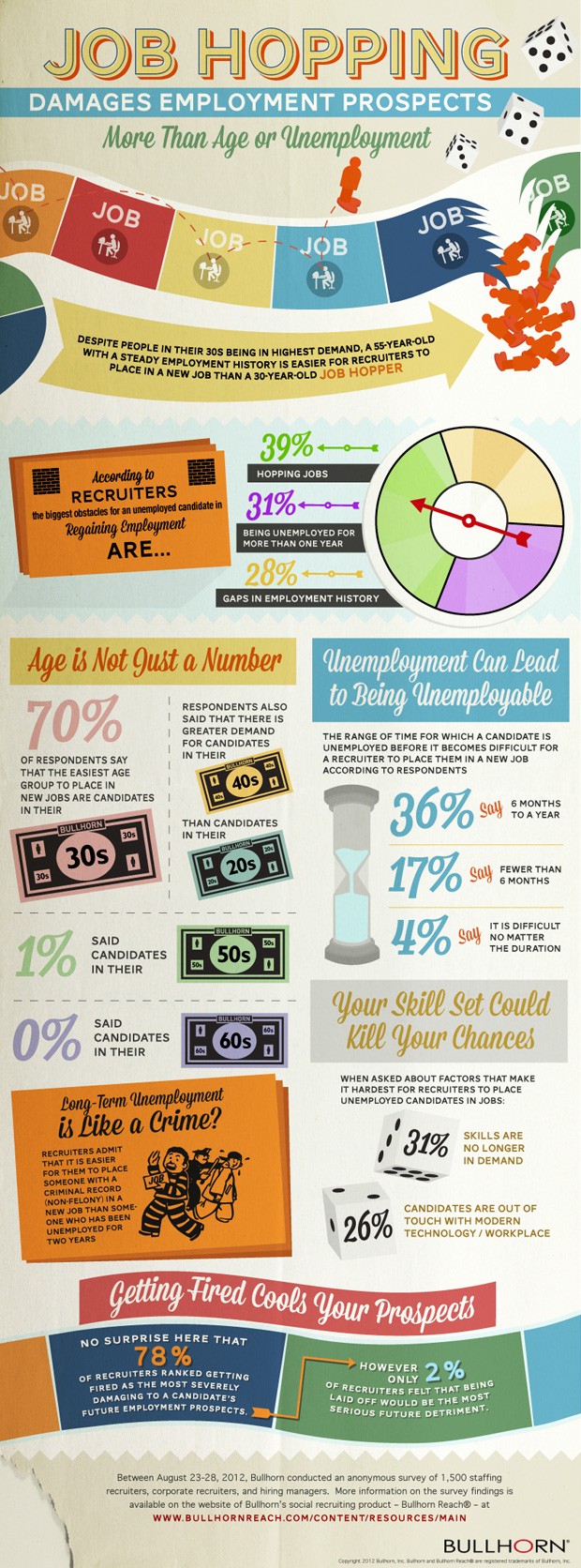I stumbled across a VERY interesting infographic from Bullhorn today that I just had to share. Its all about job hopping and how it affects your career. Since so many millennials expect to stay in a job for 3 years (max), one could easily assume that job hopping doesn’t matter anymore. But, au contraire!
Job Hopping is Bad for Your Career (…and this is why!)
As the title of the infographic below tells you, job hopping damages employment prospects more than age or unemployment. Wow! I would love to hear what my recruiter pals think of that. Do tell in the comments below.











3 Comments
I honestly do not agree with this. What about those who seem like they job hop because they have only been getting contract gigs? Can that easily be defined as being inconsistent? In today’s market, not exactly. Gen Y came out of school as there was still a recession. Those who got a job within a couple to a few months of graduating were lucky; they were in the right time and place. And out of those Gen Y who stay loyal to a company is because their manager and/or employer as a whole has not chased him/her away; they know how to retain their employees and how to keep a low turnover rate. Look at companies such as SAS, employees are so happy there that they don’t want to leave. In my general opinion, Gen Y’s aren’t looking to just buckle down anywhere they land. They grew up with new technology and have seen it progress; they want to see a challenge and be challenged. Overall Gen Y’s want to be able to start something for themselves and build upon that (i.e. find a company that can take them in as a junior and develop their skills and help develop their career as a whole).
What this whole thing fails to look at is, the big picture; why there are those who are unemployed for more an a year. There are a lot of post-secondary graduates out there who are seeking jobs but never get the opportunity. Why? Even so-called “entry level” roles require some sort of experience. If I am not correct, a position requiring 2 to 3 years of experience is not exactly “entry level”. As being a Millennial myself, I know how difficult it was to find my first paying job when I finished school. It literally took me 1 year since I graduated and another 5 month unpaid internship. Having studied Human Resources and have had experience providing assistance with orientation sessions, I understand that time is cost and cost is money and all that jazz but whatever happened to giving new graduates the time of day to actually gain experience without sacrificing the pay? Employers need to keep in mind that today’s economy is terrible and face it, most students have racked up a hefty student loan.
How about survival? Taking a job for the means of nothing but survival. Is one to be unemployed vs “job hopping”? Don’t tell me someone looks at the unemployed resumes. Now it’s trendy to discriminate against “job hoppers”. “Job hoppers” settle down if you give them a chance.
3 more points, why this thesis is not working:
– if you are working in shared service functions which are outsourced, jop hopping is mandatory
– if you are aware of your potential and your employer isn’t
– if you are aware of the psychological contract between you and the employer you know, that it is your right to change
Comments are closed.